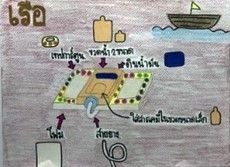การเปรียบเทียบผลการจัดการเรียนรู้โดยใช้ชุดกิจกรรมการเรียนรู้สะตีมศึกษากับกระบวนการสืบเสาะหาความรู้ (5E) เรื่อง ปฏิกิริยาเคมี สำหรับนักเรียนมัธยมศึกษาตอนปลาย
Main Article Content
Abstract
Wipawee Thananthong and Piyarat Dornbundit
รับบทความ: 28 เมษายน 2561; แก้ไขบทความ: 19 มิถุนายน 2561; ยอมรับตีพิมพ์: 16 กรกฎาคม 2561
บทคัดย่อ
การวิจัยนี้มีวัตถุประสงค์เพื่อ (1) ศึกษาแนวทางการจัดการเรียนรู้โดยการใช้ชุดกิจกรรมตามแนวทางสะตีมศึกษา เรื่อง ปฏิกิริยาเคมี ซึ่งใช้สารเคมีในชีวิตประจำวันในการจัดกิจกรรมการเรียนรู้ และ (2) เปรียบเทียบความคิดสร้างสรรค์และผลสัมฤทธิ์ทางการเรียน เรื่อง ปฏิกิริยาเคมี ของนักเรียนกลุ่มที่ได้รับการจัดการเรียนรู้ด้วยชุดกิจกรรมตามแนวทางสะตีมศึกษากับนักเรียนกลุ่มที่ได้รับการจัดการเรียนรู้ด้วยกระบวนการสืบเสาะหาความรู้ (5E) กลุ่มที่ศึกษาในงานวิจัยนี้ ได้แก่ นักเรียนชั้นมัธยมศึกษาปีที่ 4 แผนการเรียนวิทยาศาสตร์–คณิตศาสตร์ ของโรงเรียนมัธยมศึกษาแห่งหนึ่ง สังกัดสำนักงานเขตพื้นที่การศึกษามัธยมศึกษา เขต 2 กรุงเทพมหานคร จำนวน 2 ห้อง ได้จากเลือกอย่างเฉพาะเจาะจง เป็นนักเรียนที่เรียนรู้ด้วยกิจกรรมสะตีมศึกษาจำนวน 1 ห้องเรียน จำนวน 31 คน และนักเรียนที่เรียนด้วยกิจกรรมสืบเสาะหาความรู้ (5E) จำนวน 1 ห้อง จำนวน 30 คน เก็บรวบรวมข้อมูลโดยใช้แบบทดสอบความคิดสร้างสรรค์และแบบวัดผลสัมฤทธิ์ทางการเรียน เรื่อง ปฏิกิริยาเคมี เมื่อนำชุดกิจกรรมตามแนวทางสะตีมศึกษาที่ผ่านการทดลองใช้กับนักเรียนที่ไม่ใช่กลุ่มที่ศึกษาเพื่อหาประสิทธิภาพ จากนั้นไปใช้กับนักเรียนกลุ่มที่เรียนด้วยกิจกรรมสะตีมศึกษา ผลการวิจัยพบว่า นักเรียนที่เรียนโดยใช้ชุดกิจกรรมสะตีมศึกษาวิชาพื้นฐานเคมี เรื่อง ปฏิกิริยาเคมี เพื่อส่งเสริมทักษะในศตวรรษที่ 21 ระดับชั้นมัธยมศึกษาปีที่ 4 มีทักษะความคิดสร้างสรรค์ และคะแนนผลสัมฤทธิ์ทางการเรียนสูงกว่านักเรียนที่ได้รับการจัดการเรียนรู้แบบ 5E (p < .05)
คำสำคัญ: สะตีมศึกษา กระบวนการสืบเสาะหาความรู้ (5E) ปฏิกิริยาเคมี ทักษะความคิดสร้างสรรค์ ผลสัมฤทธิ์ทางการเรียน
Abstract
This research aimed to (1) apply STEAM activities to learn in the topic of Chemical Reaction using the chemical in daily life, and (2) compare students’ creative thinking and academic achievement of chemical reaction between the group of students who learned by using STEAM learning activities and the group of students who learned by using inquiry–based learning (5E) activities. The participants of this study were grade–10 students in high school under the Office of Bangkok Education Service Area 2. The two classrooms were purposively selected to be the study groups. Thirty–one students in first classroom were instructed by STEAM activities, and another 30 students in the second classroom were instructed by inquiry-based learning (5E) activities. The data collecting tools consisted of the creativity test and academic achievement test on chemical reaction. The finding indicated that the post–test scores from the creativity test and the academic achievement test in the group of students who learned by using STEAM learning activities were significantly higher than those in the group of students who learned by using inquiry–based learning (5E) activities (p < .05).
Keywords: STEAM Education, Inquiry–based learning, Chemical reaction, Creative skill, Academic achievement
Downloads
Article Details

This work is licensed under a Creative Commons Attribution-NonCommercial 4.0 International License.
References
Beers, S. Z. (2011). 21st Century Skills: Preparing Students for Their Future. Retrieved from http://www.yinghuaacademy.org/wpcontent/uploads/2014/10/21st_century_skills, March 10, 2018.
Cultural Learning Alliance. (2014). STEM+ARTS = STEAM. Retrieved from http://www.culturallearning-alliance.org.uk, January 20, 2017.
Division of Research Administration and Educational Quality Assurance. (2016). Thailand 4.0. Bangkok: Author. (in Thai)
Intavimolsri, S. (2017). Effect of Using STEAM Education Approach in Biology on Scientific Creativity and Learning Achievement of Tenth Grade Students. Master of Education Thesis. Bangkok: Chulalongkorn University. (in Thai)
Jampong, M. (2016). Development of Training Package for Work Creation through STEAM Education Approach on Energy around Us. Master of Education Thesis. Pathum Thani: Rajamangala University of Technology Thanyaburi. (in Thai)
Kim, H., and Chae, D.-H. (2016). The Development and Application of a STEAM Program based on Traditional Korean Culture. Eurasia Journal of Mathematics, Science & Technology Education 12(7): 1925–1936.
Lai, E. R., Yarbro, J., DiCerbo, K., and Geest, Ed. (2018). Skills for Today: What We Know about Teaching and Assessing Creativity. New York: Pearson.
Land, M. H. (2013). Full STEAM ahead: The benefits of integrating the arts into STEM. Procedia Computer Science 20: 547–552.
Pholmool, J., Haemaprasith, S., and Saksuparb, S. (2015). The Development of STEAM Integrated Learning Unit for Ninth Grade Students: Case Study at Wangtako Community in Chumphon Province. KKU Research Journal 3(2): 1–13. (in Thai)
Ridwan, A., Rahmawati, Y., and Hadinugrahaningsih, T. (2017). STEAM Integration in Chemistry Learning for Developing 21st Century Skills. MIER Journal of Educational Studies, Trends & Practices 7(2): 184–194.
Sousa, D. A., and Pilecki, T. (2013). From STEM to STEAM: Using brain-compatible strategies to integrate the arts: California: Corwin.
Tayea, F., Mophan, N., and Waedrama, M. (2017). Effect of STEAM Education on Science Learning Achievement, Creative Thinking and Satisfaction of Grade 5 Students towards the Learning. Management. Princess of Naradhiwas University Journal of Humanities and Social Sciences 4(2): 1–14. (in Thai)
Tunkham, P. (2016). Development of STEM Activity Packages in Chemistry on Bio molecules: Protein and Lipid to Enhance 21st Century Skills for High School. Master of Education Thesis. Bangkok: Srinakharinwirot. (in Thai)
Upper Secondary Education Bureau. (2015). 21st Century skills. Bangkok: Author. (in Thai)
Yakman, G., and Lee, H. (2012). Exploring the exemplary STEAM education in the US as a practical educational framework for Korea. Journal of the Korean Association for Science Education 32(6): 1072–1086.
Yathongchai, K. (2016). Development of STEM Education Activity Packages on “Petroleum and Alternative Energy” to Promote Critical Thinking and Problem Solving for High School. Master of Education Thesis. Bangkok: Srinakharinwirot. (in Thai)
